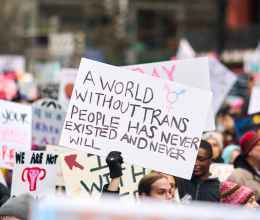This case concerns a ban on life-saving medical treatment for incarcerated people with gender dysphoria.
Gender dysphoria arises when someone experiences clinically significant distress based on an incongruence between their gender identity (that is, their internal sense of gender) and sex designated at birth. Everyone has a gender identity; however, for some people, it does align with their sex assigned at birth. That, in and of itself, is not a health disorder. Gender dysphoria arises when people experience clinically significant distress from the incongruence. If untreated, gender dysphoria can result in severe anxiety and depression, self-harm, and suicidality.
The widely approved treatment for gender dysphoria resolves the distress by enabling individuals to live consistently with their gender identity. That can involve social transition (such as using a name, pronoun, and clothing associated with one’s gender identity), hormone treatment to masculinize or feminize the body, and surgeries to change certain sex characteristics. During the first Trump administration, and the Biden administration, the Federal Bureau of Prisons (BOP) provided gender affirming care to incarcerated people with gender dysphoria when a doctor concluded doing so was appropriate.
On January 20, 2025, President Trump issued an Executive Order titled “Defending Women from Gender Ideology Extremism and Restoring Biological Truth to the Federal Government.” The order bans BOP from using federal funds for “any medical procedure, treatment, or drug for the purpose of conforming an inmate’s appearance to that of the opposite sex.” BOP responded to the order by banning incarcerated transgender people from obtaining accommodations (such as gender-appropriate undergarments) and terminating (or threatening to terminate) their hormone treatments. BOP restored at least some individuals’ hormone treatment, but only after this lawsuit was filed and a court intervened in a related case.
Plaintiffs Alishea Kingdom, Solo Nichols, and Jas Kapule—all incarcerated transgender individuals with gender dysphoria—bring this case on behalf of themselves and others similarly situated in order to protect their basic right to crucial medical care and equal treatment under the law.

